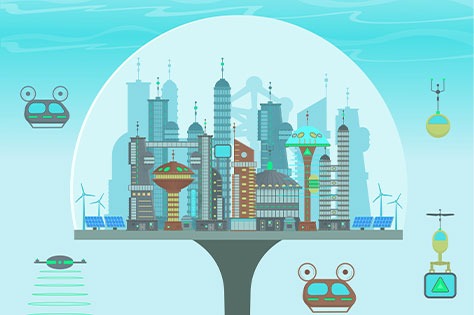
Modern infrastructure refers to the interconnected systems and networks that are essential for the functioning of society in the 21st century. As we continue to rely on modern infrastructure for the functioning of society, we also face an increasing number of threats that can put our safety and well-being at risk. From power grids that keep our lights on to transportation systems that get us from point A to point B, these critical systems are vulnerable to attacks from malicious actors who exploit vulnerabilities in the infrastructure.
In this blog post, we will explore some of the most significant threats to modern infrastructure and the potential consequences of such attacks.
Physical Threats: Physical threats pose a significant risk to modern infrastructure systems. Acts of terrorism, sabotage, and bombings are just a few examples of the range of physical threats that can cause catastrophic damage to infrastructure assets, either fully or partially. The 2016 attack at Istanbul Ataturk Airport in Turkey is a tragic example of this, where a group of terrorists carried out a coordinated attack involving the detonation of explosive devices and engaging in a violent gun battle with security personnel. The attack resulted in the loss of 45 lives and over 200 injuries, highlighting the severe consequences of physical threats to infrastructure systems.
Insider Threat: Infrastructure can be threatened by insiders who have authorized access to systems and data and misuse their privileges to steal or destroy data, disrupt operations, or compromise systems. In July 2020, the Twitter hack demonstrated a prime example of a modern infrastructure insider threat. High-profile individuals and organizations, such as Barack Obama, Elon Musk, and Apple, had their accounts breached by hackers who leveraged them to promote a Bitcoin scam. The attackers targeted a few Twitter employees who had access to the internal tools and systems of a company, using social engineering and phishing techniques. This incident highlights the potential harm that a small number of insiders with access to critical systems and data can cause.
Social engineering attacks: Attackers can employ social engineering tactics to target infrastructure, deceiving or manipulating users or employees to disclose sensitive information. For example in 2018, Hong Kong-based airline Cathay Pacific revealed that it had suffered a data breach in which the personal information of 9.4 million customers had been stolen. The breach was attributed to a phishing attack that targeted the company's IT systems.
Physical Condition/Aging Materials (Material Fatigue): The use of appropriate building materials is crucial for creating sustainable and cost-effective structures in the built environment. However, infrastructure composites are subject to degradation over time and require rehabilitation. Repeated stress and strain on materials can cause flaws and weakening, ultimately leading to catastrophic failures that pose a grave danger to the safety and functionality of structures ranging from towering bridges to residential buildings. The tragic collapse of Champlain Towers South in Surfside, Florida is a harrowing example of this threat, with investigators discovering significant evidence of structural damage and deterioration, such as cracks and corrosion, that likely contributed to the devastating collapse and loss of 98 lives.
Lacking, Inadequate, or Excessively Deferred Infrastructure Maintenance: Maintaining infrastructure involves more than simply fixing things after they break. It requires a proactive approach to identifying potential problems before they can occur and taking measures to prevent them. Proper maintenance is crucial in preventing accidents and disasters that can have devastating consequences. The collapse of the Morandi Bridge in Genoa, Italy in August 2018 serves as a recent example of inadequate infrastructure maintenance. This bridge, which was a major transportation artery, collapsed during heavy rainfall, resulting in the deaths of 43 people and injuries to many others. The investigation into the cause of the collapse determined that insufficient maintenance played a significant role. The bridge had not received proper maintenance over the years, and its structural integrity had been compromised.
Lack of Technological Upgrades: In the fast-paced world of technology, neglecting to incorporate advanced systems such as sensors, automated controls, CCTV, fire detection and prevention mechanisms, water sprinklers, and other critical features can pose a significant threat to modern infrastructure. Failing to keep up with the latest tools and upgrades can lead to inefficiencies and security vulnerabilities that put lives at risk. The tragic example of Grenfell Tower, where 72 people lost their lives in a fire caused by a faulty refrigerator, highlights the importance of ensuring adequate fire safety measures, including non-flammable cladding and reliable sprinkler systems, to prevent such disasters from occurring.
Ensuring the security of modern infrastructure is a colossal undertaking that poses a significant challenge for both public and private organizations. However, amidst this complex and ever-changing landscape, one company that remains steadfast in its mission to protect our critical infrastructure is GEMS, a GMR group company.
For the past 15 years, GEMS has been committed to delivering cutting-edge safety and security solutions that encompass both physical and digital realms. By leveraging smart individuals, advanced surveillance technologies, and innovative security measures, GEMS has successfully safeguarded modern infrastructures from a range of potential threats. These solutions include state-of-the-art fire prevention and detection systems, automated baggage handling and sorting systems, integrated hold baggage screening solutions, and new-age passenger screening equipment and technologies. With GEMS' focus on smart solutions, clients can be confident that they are receiving top-tier security measures that are tailored to meet their unique needs.
If you need any services, drop us a mail at Rohitkumar.Singh@gmrgroup.in or get in touch with us at +919717199753.